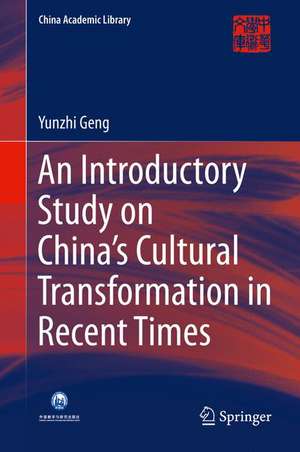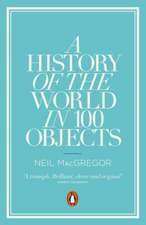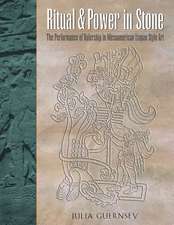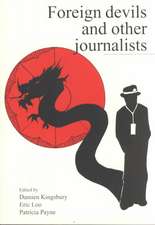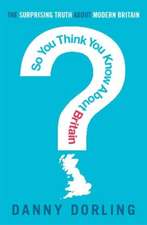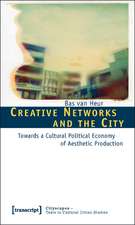An Introductory Study on China's Cultural Transformation in Recent Times: China Academic Library
Autor Yunzhi Gengen Limba Engleză Hardback – 4 noi 2014
| Toate formatele și edițiile | Preț | Express |
|---|---|---|
| Paperback (1) | 648.05 lei 6-8 săpt. | |
| Springer Berlin, Heidelberg – 10 sep 2016 | 648.05 lei 6-8 săpt. | |
| Hardback (1) | 654.43 lei 6-8 săpt. | |
| Springer Berlin, Heidelberg – 4 noi 2014 | 654.43 lei 6-8 săpt. |
Din seria China Academic Library
- 20%
 Preț: 580.27 lei
Preț: 580.27 lei -
 Preț: 387.58 lei
Preț: 387.58 lei -
 Preț: 392.97 lei
Preț: 392.97 lei - 15%
 Preț: 648.24 lei
Preț: 648.24 lei -
 Preț: 388.90 lei
Preț: 388.90 lei -
 Preț: 393.35 lei
Preț: 393.35 lei -
 Preț: 387.38 lei
Preț: 387.38 lei - 15%
 Preț: 586.05 lei
Preț: 586.05 lei -
 Preț: 382.18 lei
Preț: 382.18 lei - 15%
 Preț: 643.84 lei
Preț: 643.84 lei -
 Preț: 396.24 lei
Preț: 396.24 lei -
 Preț: 394.87 lei
Preț: 394.87 lei -
 Preț: 398.15 lei
Preț: 398.15 lei - 18%
 Preț: 739.62 lei
Preț: 739.62 lei - 20%
 Preț: 565.09 lei
Preț: 565.09 lei - 18%
 Preț: 729.36 lei
Preț: 729.36 lei - 15%
 Preț: 650.04 lei
Preț: 650.04 lei - 15%
 Preț: 585.08 lei
Preț: 585.08 lei -
 Preț: 386.22 lei
Preț: 386.22 lei - 20%
 Preț: 587.03 lei
Preț: 587.03 lei - 15%
 Preț: 638.89 lei
Preț: 638.89 lei -
 Preț: 389.70 lei
Preț: 389.70 lei -
 Preț: 389.88 lei
Preț: 389.88 lei -
 Preț: 384.09 lei
Preț: 384.09 lei - 15%
 Preț: 643.16 lei
Preț: 643.16 lei - 18%
 Preț: 906.48 lei
Preț: 906.48 lei -
 Preț: 394.51 lei
Preț: 394.51 lei - 15%
 Preț: 643.99 lei
Preț: 643.99 lei -
 Preț: 388.72 lei
Preț: 388.72 lei -
 Preț: 392.21 lei
Preț: 392.21 lei -
 Preț: 389.88 lei
Preț: 389.88 lei -
 Preț: 394.87 lei
Preț: 394.87 lei
Preț: 654.43 lei
Preț vechi: 769.92 lei
-15% Nou
Puncte Express: 982
Preț estimativ în valută:
125.26€ • 136.11$ • 105.29£
125.26€ • 136.11$ • 105.29£
Carte tipărită la comandă
Livrare economică 21 aprilie-05 mai
Preluare comenzi: 021 569.72.76
Specificații
ISBN-13: 9783662445891
ISBN-10: 3662445891
Pagini: 350
Ilustrații: X, 442 p.
Dimensiuni: 155 x 235 x 30 mm
Greutate: 0.81 kg
Ediția:2015
Editura: Springer Berlin, Heidelberg
Colecția Springer
Seria China Academic Library
Locul publicării:Berlin, Heidelberg, Germany
ISBN-10: 3662445891
Pagini: 350
Ilustrații: X, 442 p.
Dimensiuni: 155 x 235 x 30 mm
Greutate: 0.81 kg
Ediția:2015
Editura: Springer Berlin, Heidelberg
Colecția Springer
Seria China Academic Library
Locul publicării:Berlin, Heidelberg, Germany
Public țintă
ResearchCuprins
Introduction.- Evolution in Ideology and Culture after the Opium Wars and up to the Westernization Movement.- The Leading Roles of Reform and Revolution in the Socio-Cultural Trends of the Final Years of the Qing Dynasty.- Initial Shaping of Social Public Cultural Spaces at the End of the Qing Dynasty.- Major Trends in Ideological and Cultural Transformation toward the End of the Qing Dynasty.- Political Disarray and Conflicts between New and Old Ideology in the First Years of the Republic.- Rise of the New Culture Movement.- The Social Foundations of the New Culture Movement.- From Cultural Movement to Political Movement.- Evolutions in the Role of Conservatism in the Transition to a Modern Culture.- Political Change and Cultural Transition.
Notă biografică
Geng Yunzhi, born 1938 in Haicheng, Liaoning Province. Graduated from the Department of Philosophy of Liaoning University in 1964. Currently a member of the Chinese Academy of Social Sciences, researcher at the Institute of Modern History and doctoral student supervisor, concurrently director of the Society of Chinese Modern Culture and the Hu Shih Research Association as well as president of the China Modern Thought Research Center. In the past forty or so years, Geng Yuzhi has consistently researched China’s modern political history, ideological history and cultural history and written some twenty books, among which are primarily History of the Republic of China, vol. 1 (co-authored), Hu Shih: Research Drafts, A Chronicle of Hu Shih, Rediscovering Hu Shih, Liang Qichao (co-authored), Western Democracy in Modern China, Collected Writings of Geng Yunzhi, Polygonum Grass Collection and Hu Shih’s Posthumous Writings and Confidential Letters. He has also published more than two hundred theses and articles. The Laboratory of the History of Modern Thought he personally set up is among the first key subjects at the Chinese Academy of Social Sciences.
Textul de pe ultima copertă
This book examines in detail the basic trajectory of the cultural transformation and brings to light the extrinsic conditions and intrinsic mechanisms involved. It focuses on the period from after the Opium Wars to the New Culture Movement, as the New Culture Movement can be considered a pivotal phase in the cultural transformation of modern-day China. The New Culture Movement was a revolutionary eruption triggered by the accumulation of all the new qualitative cultural factors since the Opium Wars. Superficially, the movement’s goal seemed to be to overthrow the traditional culture. But in essence its true objective was to conduct an overall “screening” of that culture. The book elaborates a broad variety of points in this context, including: the ideological and cultural evolution following the Opium Wars; the pressing challenges faced by “Zhong Ti”; the initial shaping of social, public and cultural spaces and major trends in ideological and cultural transformation at the end of theQing Dynasty; the political disarray and conflicts between the new and old ideology in the first years of the Republic; the rise of the New Culture Movement; and the role of conservatism in the transition to a modern culture.
Caracteristici
Provides a fairly clear description of the basic trajectory of the cultural transformation Brings to light the extrinsic conditions and intrinsic mechanisms of the cultural transformation Uses the period from after the Opium Wars to the New Culture Movement as the basic time interval for investigations Includes supplementary material: sn.pub/extras
